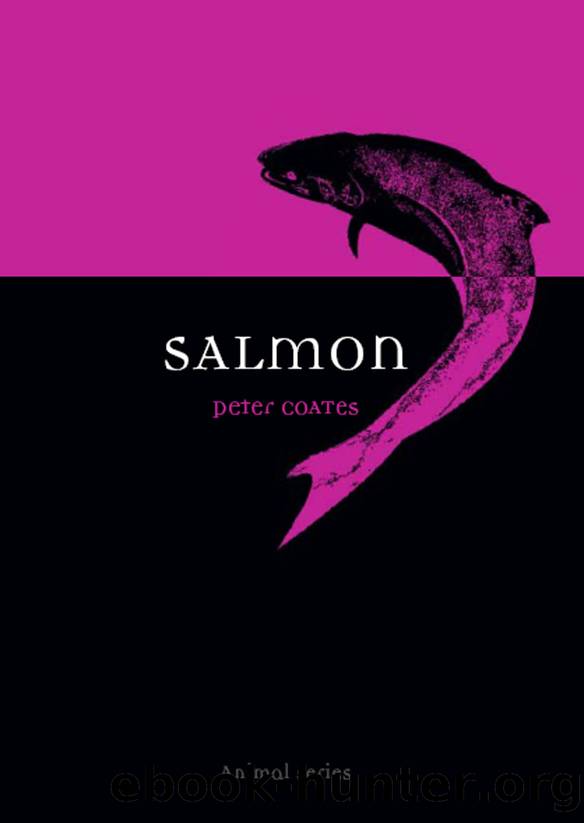Salmon by Peter Coates

Author:Peter Coates
Language: eng
Format: epub
Publisher: Reaktion Books
An early 19th-century warning to poachers posted by the owners of salmon fishing rights on the River Hodder in north Lancashire.
POACHED SALMON
For those who enjoy legal ownership of the coveted salmon, the most ruthless predator, as already intimated, is often the excluded human. On the early nineteenth-century Tweed in southern Scotland, far from being a solitary and furtive act, poaching was a well-organized, largely overt activity attracting a wide cross-section of the non-gentlemanly community, from shepherds to publicans. Local police and magistrates more or less condoned a practice known as ‘burning the waters’ that was celebrated in poem, song and novel. Thomas Tod Stoddart of Kelso, one of the Tweed’s leading nineteenth-century gentleman anglers, was unwilling to condemn outright a ‘manly and vigorous’ activity with no commercial purpose that was legitimized by ‘immemorial usage’.9 His collections of angling songs and poems included ‘Sonnet – A Reminiscence of Leistering’, which was redolent with classical allusions.
A figure stood
Upon the prow with tall and threatening spear,
When suddenly in the stream he smote.
Methought of Charon and his leaky boat;
Of the torch’d Furies, and of Pluto drear,
Burning the Stygian tide for lamprey vile10
Stoddart also found room for ‘The Leisterer’s Song’, which opens and closes with these stanzas.
Flashes the blood-red gleam
Over the midnight slaughter,
Wild shadows haunt the stream,
Dark forms glance over the water.
It is the leisterer’s cry!
A salmon, ho! oho!
In scales of light the creature bright
Is glimmering below.
Rises the cheering shout,
Over the rapid slaughter;
The gleaming torches flout
The old, oak-shadow’d water.
It is the leisterer’s cry!
The salmon, ho! oho!
Calmly it lies, and gasps and dies,
Upon the moss bank low! 11
Salmon are attracted to bright objects; and a torch of burning heather or pine root held over a pool on a dark winter’s night revealed all to a considerable depth. The leister was an iron trident with five barbed prongs attached to a five-metre shaft.12 Parties usually consisted of an oarsman, leisterer and torchbearer/gaffer. By the end of the night’s exertions, their backs would be half-frozen and their fronts nearly scorched. Though some poachers wore masks of black crape, leistering was a spectator sport, with much merriment among the hangers on crowding the Tweed’s banks.13
Walter Scott, who resided on the upper Tweed at Abbotsford, and was an angler and local magistrate to boot, was particularly well qualified to report on this local custom. His historical novel, Guy Mannering (1815), contained a heavily romanticized description of the thrilling nocturnal pandemonium that burning the waters entailed.14 The voraciousness of poaching at the redds, Scott believed, could only be explained by a desire to retaliate upon those who engrossed all the fish during the open season, by destroying all such as the close-time throws within the mercy of the high country’.15 Scott proceeded to explain that landowners and the ‘better class of farmers’ regarded leistering ‘with perfect indifference’. Prosecutions were rare because ‘proof of delinquency’ was hard to secure in remote country. Officials often colluded too, with leistered salmon sometimes ended up on the dinner tables of unscrupulous water bailiffs. William Scrope,
Download
This site does not store any files on its server. We only index and link to content provided by other sites. Please contact the content providers to delete copyright contents if any and email us, we'll remove relevant links or contents immediately.
Sapiens: A Brief History of Humankind by Yuval Noah Harari(13050)
The Tidewater Tales by John Barth(12029)
Do No Harm Stories of Life, Death and Brain Surgery by Henry Marsh(6336)
Mastermind: How to Think Like Sherlock Holmes by Maria Konnikova(6234)
The Thirst by Nesbo Jo(5785)
Why We Sleep: Unlocking the Power of Sleep and Dreams by Matthew Walker(5640)
Sapiens by Yuval Noah Harari(4535)
Life 3.0: Being Human in the Age of Artificial Intelligence by Tegmark Max(4505)
The Longevity Diet by Valter Longo(4445)
The Rules Do Not Apply by Ariel Levy(3905)
The Immortal Life of Henrietta Lacks by Rebecca Skloot(3826)
The Body: A Guide for Occupants by Bill Bryson(3799)
Why We Sleep by Matthew Walker(3771)
Animal Frequency by Melissa Alvarez(3754)
Yoga Anatomy by Kaminoff Leslie(3700)
Barron's AP Biology by Goldberg M.S. Deborah T(3631)
The Hacking of the American Mind by Robert H. Lustig(3579)
All Creatures Great and Small by James Herriot(3515)
Yoga Anatomy by Leslie Kaminoff & Amy Matthews(3394)
